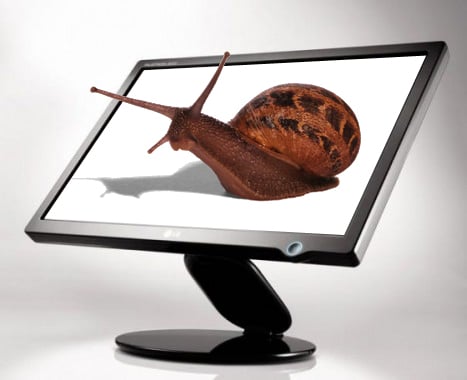A slow computer can be frustrating to use. Whilst PCs tend to slow down naturally with age, there are many individual factors that can cause a computer to perform slower. If you’ve noticed recently that your computer is taking ages to load, here are a few possible causes that could be worth looking into and what you can do to get your computer running normally again.

You need to restart your computer
This is a fairly simple cause, but one that many people overlook. If your computer is often left in standby, there could be background processes piling up. In most cases, whenever you close a programme, certain processes from that programme continue to run. These can start to slow down your computer as they build up.
You may be able to manually end these processes in task manager, but because it’s not always easy to determine which processes are which, shutting down your computer can be a much easier way of ending these background processes. Ideally, you should shut down your PC at least twice a week – this can also be important for downloading the latest software updates.
You need to declutter your computer
Too many files on your computer could be causing you to run out of hard drive space. Once your hard drive gets to 95% capacity you’ll notice that it starts to seriously slow down. However, many computers may start to slow down well before this simply because data is being stored in the wrong place (defragging your computer can solve this).
There are all kinds of ways to declutter your computer. Deleting unnecessary files is one way to free up space and help speed up your computer. When doing this, you may be able to move certain files to an external hard drive or the cloud so that they’re not taking up space on your computer’s hard drive. You can also find ways of freeing up application memory, such as deleting unwanted programmes and browser extensions – you can follow this link for more information on freeing up this type of memory. Defragging your computer could also help.
You need to upgrade your RAM
Even by clearing out your computer, you may find that certain files and software take up too much memory. Cheaper and older computers tend to suffer from this problem more and may not be built to meet the demands of today’s complex and flashy programmes (the likes of Microsoft Word and Adobe Photoshop are some of the biggest popular culprits).
Upgrading your RAM could give you more memory to work with, allowing you to use these more demanding programmes – you can find out more information on this here.
There are too many start up programmes
Does your computer take ages to load when initially starting it up? This is likely to be the result of having too many start up programmes. These are programmes that automatically load up when you turn on your computer.
Changing the settings of a few of these programmes so that they don’t automatically open up could help your computer to load more quickly during start up. It’s worth allowing certain programmes to automatically start up like anti-virus software, however you probably don’t need Spotify or Steam to automatically load up.
Your hard drive is faulty
A slow computer could be the result of a hardware issue. Hard drives can naturally wear over time and may often cause a computer to act slowly. It may only take two to three years of consistent use for this to happen. Hard drives can also be damaged if you happen to drop your computer or spill something on it. Dust may also accumulate in fans and cause a hard drive to overheat.
In all cases, this is something that may require the help of an IT technician. A new hard-drive may be the only solution – if you catch the problem early enough, you should be able to salvage all your files, allowing you to transfer them to a new hard drive and continue on as normal.
You’ve got a virus
It’s possible that there could also be a virus on your computer causing it to act slowly. If you’ve also noticed a rogue programme on your desktop or weird ads appearing in your browser, it’s possible that you could have malware installed – this is a malicious programme that will install itself on your computer and usually try to generate income by clogging your browsers full of ads. Some malware may even disguise as anti-virus software and tell you that you have viruses on your computer when it is in fact the cause of the virus!
A robust security programme should be able to detect and block these viruses. That said sometimes a virus may sneak past, especially if it’s a new virus and your anti-virus software hasn’t been updated recently. Taking your computer to a technician could help you to get to the bottom of the issue.
Your anti-virus software is being overprotective
Occasionally, anti-virus software can be to blame. Such software can use up a lot of processing power simply by scanning your computer in the background.
You may find that it does scheduled scans at certain times of the day – changing the time of these scans to late at night when you’re not using your computer could prevent them from interfering with your day-to-day computer usage. Make sure that you also don’t have two conflicting anti-virus programmes installed that may be working against one another, resulting in your computer acting slowly.
Like this:
Like Loading...



